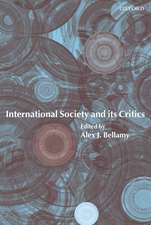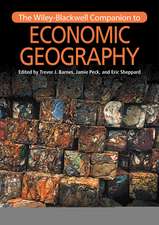On the Causes of War
Autor Hidemi Suganamien Limba Engleză Hardback – 15 feb 1996
Preț: 1108.28 lei
Preț vechi: 1687.82 lei
-34% Nou
Puncte Express: 1662
Preț estimativ în valută:
212.10€ • 220.61$ • 175.10£
212.10€ • 220.61$ • 175.10£
Carte tipărită la comandă
Livrare economică 04-10 aprilie
Preluare comenzi: 021 569.72.76
Specificații
ISBN-13: 9780198273387
ISBN-10: 019827338X
Pagini: 244
Dimensiuni: 146 x 224 x 19 mm
Greutate: 0.43 kg
Ediția:New.
Editura: Clarendon Press
Colecția Clarendon Press
Locul publicării:Oxford, United Kingdom
ISBN-10: 019827338X
Pagini: 244
Dimensiuni: 146 x 224 x 19 mm
Greutate: 0.43 kg
Ediția:New.
Editura: Clarendon Press
Colecția Clarendon Press
Locul publicării:Oxford, United Kingdom
Recenzii
Suganami goes back to his intellectual roots, to political science, not history. The intelligence and rigour of his arguments ought to impress both disciplines.
This is a good and very readable book. Anyone interested in the causes of war or the philosophy of explanation in International Relations should read it. It will be very helpful to graduate students and third year undergraduates.
Suganami presents On the Causes of War as a corrective; in reality, he is tearing up Waltz's book and starting again.
The intelligence and rigour of his arguments ought to impress both disciplines [history and political science].
Suganami's taut, spare, disciplined, analytical.
A strength of Suganami's approach is the width of the scholarship he considers ... this is a good and very readable book. Anyone interested in the causes of was or the philosophy of explanation in International Relations should read it. It will be very helpful to graduate students and third year undergraduates, and so the publishers should think quickly of a paperback edition.
Hidemi Suganami's book is a detailed analysis of the substantive problems of the causes of war, embedded in a careful analysis of the relevant issues in the philosophy of the social sciences ... A strength of Suganami's approach is the width of the scholarship he considers ... this is a good and very readable book. Anyone interested in the causes of war or the philosophy of explanation in International Relations should read it. It will be very helpful to graduate students and third year undergraduates, and so the publishers should think quickly of a paperback edition.
Students of war are well-advised to pay heed to Suganami's critique, but this compact essay would make worthwhile reading for all social scientists and historians. It is a fundamental inquiry into the nature of explanation and causation, problems that far too often are taken for granted rather than articulated explicitly ... Suganami shows us how we can better link the scientific and ethical domains.
Suganami's book is a much needed contribution to a field which for too long has been dominated by over-confident grand theorists and over-ambitious empirical researchers ... His book is a brilliant demonstration of the fact that an exercise in the philosophy of science really can pay off in terms of concrete empirical analysis. The book should be prescribed reading for all scholars of international conflicts. It fits perfectly in a course on the origins of war, even, I think, one at a fairly elementary level.
The range of discussion in this volume is broad indeed.
The fusion of historical and philosophical approaches does lead to insights of value...He also offers a persuasive analysis of the relationship between war origins in general and the location of the sources of specific wars.
a complex philosophical treatment of the idea of causation ... He provides a new way of examining the past to learn how wars could have been avoided and why they were brought about. Those engaged in peace research, and especially those concerned with normative peace studies or with doing empirical research in a postpositivist vein, will find this book of interest.
This is a good and very readable book. Anyone interested in the causes of war or the philosophy of explanation in International Relations should read it. It will be very helpful to graduate students and third year undergraduates.
Suganami presents On the Causes of War as a corrective; in reality, he is tearing up Waltz's book and starting again.
The intelligence and rigour of his arguments ought to impress both disciplines [history and political science].
Suganami's taut, spare, disciplined, analytical.
A strength of Suganami's approach is the width of the scholarship he considers ... this is a good and very readable book. Anyone interested in the causes of was or the philosophy of explanation in International Relations should read it. It will be very helpful to graduate students and third year undergraduates, and so the publishers should think quickly of a paperback edition.
Hidemi Suganami's book is a detailed analysis of the substantive problems of the causes of war, embedded in a careful analysis of the relevant issues in the philosophy of the social sciences ... A strength of Suganami's approach is the width of the scholarship he considers ... this is a good and very readable book. Anyone interested in the causes of war or the philosophy of explanation in International Relations should read it. It will be very helpful to graduate students and third year undergraduates, and so the publishers should think quickly of a paperback edition.
Students of war are well-advised to pay heed to Suganami's critique, but this compact essay would make worthwhile reading for all social scientists and historians. It is a fundamental inquiry into the nature of explanation and causation, problems that far too often are taken for granted rather than articulated explicitly ... Suganami shows us how we can better link the scientific and ethical domains.
Suganami's book is a much needed contribution to a field which for too long has been dominated by over-confident grand theorists and over-ambitious empirical researchers ... His book is a brilliant demonstration of the fact that an exercise in the philosophy of science really can pay off in terms of concrete empirical analysis. The book should be prescribed reading for all scholars of international conflicts. It fits perfectly in a course on the origins of war, even, I think, one at a fairly elementary level.
The range of discussion in this volume is broad indeed.
The fusion of historical and philosophical approaches does lead to insights of value...He also offers a persuasive analysis of the relationship between war origins in general and the location of the sources of specific wars.
a complex philosophical treatment of the idea of causation ... He provides a new way of examining the past to learn how wars could have been avoided and why they were brought about. Those engaged in peace research, and especially those concerned with normative peace studies or with doing empirical research in a postpositivist vein, will find this book of interest.














